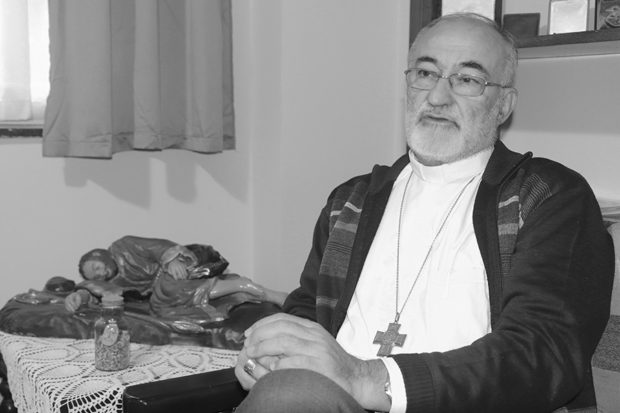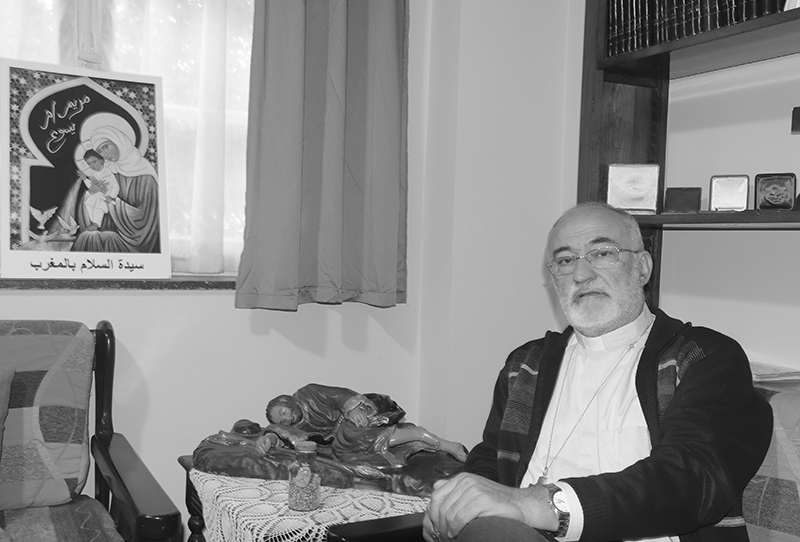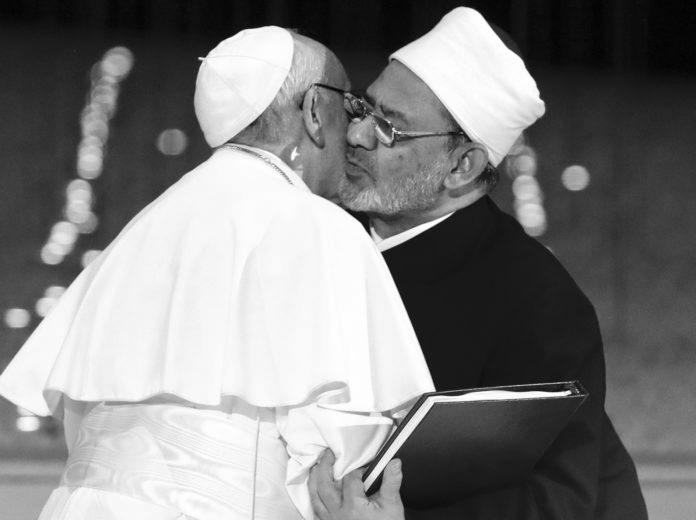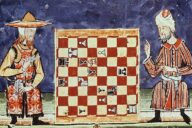Inés Eléxpuru – FUNCI
Last September 1st, Cristóbal López Romero, former archbishop of Rabat, Morocco, was designated Cardinal by Pope Francis. This appointment is in line with the promotion of intercultural dialogue strategy launched by the Pope. In this interview, López Romero speaks about interreligious dialogue, education and equality, and migrations.
Cardinal Cristóbal is different from what one might expect from a Cardinal. To find his home and workplace isn’t easy. Based in Rabat’s city center, no one knows its exact location. It’s hard to find. A small gate and sign finally allow us to recognize this humble archbishopric.
The man opens the door himself, receives, checks the mail, and invite us to his office, a colorful space filled with books, papers, religious figures, to which the carpets give a Moroccan touch. His tone of voice is strong and youthful, different from that of regular Catholic preachers. He gets up and sits with energy, tells us about his many daily activities and adventures with the Catholic and Muslim community, he answers to other visits that ring at the door, and offers us some tea and chocolates, “they are really good”.
When he answers to the questions of this journalist, he closes his eyes, reflects and answers slowly and at length.
Your trajectory has been marked by the support of dialogue between Islam and Christianism. What is the contribution of this dialogue?
Interfaith dialogue is not an end, but a means. It allows us to feel better, to appreciate us, and, finally, to achieve the confidence to work together for peace, fraternity and the creation of a better world. Dialogue is the way to reach this rapprochement, but its end has to be the achievement of a better world with which we all dream. Without this understanding, everything else is practically impossible.
Do you think that religious traditions regulate the understanding between peoples, or that, on the contrary, is it personal empathy that conditions friendship and coexistence?
Originally, all religions push towards understanding, dialogue and love. The problem is that religions are also a tool, which can be correctly or wrongly used. For example, throughout History, we can see how many times religion has been used to justify wars, massacres, discrimination… and when this happens, these religions claim “this is not the real religion!” [he opens his eyes and raises his voice energetically].
Just as Islam says now every time there is a terrorist attack, “this is not the real Islam”. But there is people using Christianism, Islam, or Hinduism to carry out acts that contradict completely the essence of this beliefs. That is why it is important for people to discover that religion is not the end, but the means to reach God. An experience of reaching God that always implies meeting the brother. And this leads to peace, justice, and freedom… That is why we even need to collaborate with people with no specific religion, but that defends those same values.
Interfaith dialogue is not an end, but a means. It allows us to feel better, to appreciate us, and, finally, to achieve the confidence to work together for peace, fraternity and the creation of a better world.
What steps do we need to take to reach this interfaith respect?
An important thing we need to change, or to improve, is education, especially regarding religious and civic education in every country. To make it more open, so that it aims at getting to know all religions and spiritualties, and, especially, so that it inspires respect towards the other, no matter who they are, so that they are not perceived as a danger, threat, or enemy. If this is not achieved through education, it is very difficult to encourage it afterwards.
The second battleground [laughs], in the good sense of the word, is communication. Social media could do a lot in this sense. Thirdly, religious authorities also need to foster this dialogue, each of them in their own field – some of them have already began to do it –, and to organize meetings that show this effort. In Morocco, for example, the meeting between the Pope and the King has been an example to many who maybe didn’t understand it.
Do you think that we need to give an equal status to all forms of worship in Spain? In that case, what is the best way of doing so, in your opinion?
The principle is to treat everyone equally. The problem is that, when the percentages are very different, the results are, logically, going to be very different. Let’s say the state wants to help the different religions and institutions working in the social sphere. Logically, the Catholic church is going to receive more funds, as it is a majority in the country and, therefore, it has more volunteers, institutions, etc. But the respect, and the regulations, have to be the same for all of them. If ten families are asking for religious education for their children, we have to assign them a teacher. And that should be valid for Jews and Muslims, and Baptists and Catholics, and Buddhists. It should depend on demands of society.
An important thing we need to change, or to improve, is education, especially regarding religious and civic education in every country.
Pope Francis has sometimes referred to a “vocational bleeding” in the Catholic church, whereas, in majority Muslim countries, we see an increase in religious awareness, and even conversions in the West. What do you think is the reason for these phenomena?
Well, we would need first to look at where did the Pope speak of a “bleeding”, and in what context. Although it is true that there are many vocations to priesthood and religious life, there are also more laypersons who commit as catechists, as social agents or of evangelization. Also, geographically, Europe and Africa aren’t the same. I just read that, in Burundi, they have opened a seminary to gather 200 seminarians who wanted to become priests. However, in Europe, it is true that most of the seminaries are empty. Nowadays, there are more committed laypeople than when I was a kid. Now, every parish church has 10, 20 or 50 laypeople in charge of different aspects. Here in Morocco, among the few Christians we are, there are many committed to ecclesiastical matters.
In spite of this, I think that the religious zeal existing in some religious traditions is remarkable. Whereas in many parts of the world it wanes, in other parts it increases, and that depends a lot of the social and economic conditions. Where there is more poverty, there is more vocation. Where there is more comfort, it wanes.
But how do you explain this zeal in the so-called Islamic world?
I am not an expert in the Islamic world, as I just know Morocco. What I can see is that Islam is a missionary religion. All Muslim wants Islam to proliferate. I can see that among all Muslims, even those who don’t go to the mosque. But, with regard to the religious practice, the situation in Morocco is similar to that of Spain. There are a few who go to the mosque always, even at 5.00 am in the morning. But there is also a big number of them who go only in special occasions, on Fridays or on religious celebrations. And then there are those who never go, but don’t tell them they are not Muslims! Now, the day that the religious stops being linked to the political, maybe we witness a strong religious decrease, just as it happened in Spain.
What I do see in Islam is many people convinced of their faith, that practice it enthusiastically. In fact, Charles de Foucauld, who came to Morocco, recovered his Christian faith inspired by the way Muslims prayed. He was really attracted by that deep contact with God, that life of faith that comprises everything. It is not a moment of reflection or religious practice. All day, life is impregnated by religion, and that is something that we, as Christians, should recover. It is a life in constant union with God.
Charles de Foucauld, who came to Morocco, recovered his Christian faith inspired by the way Muslims prayed. He was really attracted by that deep contact with God, that life of faith that comprises everything.
We are witnessing an increase in intolerant movements all across Europe, which defend the rejection of immigrant population, and, more in particular, of the Muslim population. What do you think it can be done to counteract this tendency?
A key statement, in my opinion, is “let’s talk less about Muslims, and more with Muslims”. Because in Spain I have met people who speak about Muslims without having ever met one [he raises his tone], they don’t know their name or last, absolutely anything about their life. And when a person with negative prejudices finally meets one Muslim, he says: “wow, they are like us!”. And what did you think? That they were Martians, aliens, or what? [Laughs]. That kind of dialogue, among equals, is going to help us tear down many walls and prejudices, and they need to do the same thing with us.
You have sometimes claimed your opposition to exclusionary nationalisms that only worry about their well-being, while excluding the foreign population. Could you please explain us your point of view?
I said that in relation with a statement that is repeated in Spain very frequently when governors adopt a decision: “We have done this because it is good for Spain and the Spanish population”. The phrase was coined by former president Mr. Rajoy, and he repeated it very often. Ok, so if it is good for the Spanish population, but it hurts the Portuguese, or the Moroccans, we don’t care! Then, we cannot complain if the Catalan population says, “we want this because it is good for Catalonia and the Catalan population”. And then, when Catalonia gains independence, Barcelona will say, “in Barcelona we want a different thing”, until we hear: “I do this because it is good for me and my family, or even, because it is good for me only”. This is the main way to consecrate selfishness.
A key statement, in my opinion, is “let’s talk less about Muslims, and more with Muslims”.
I never hear anyone say, “although it is not good for us, we do this because it is good for humankind. We are going to tighten our belts because, if not, other are going to starve to death”. Or, “we are going to decrease our use of cars and carbon footprint because we are damaging humankind if we don’t do it”. This is what nationalism represents, be it the Spanish, French, or English… We need a more holistic and universal vision. I like to say: mi house is the world, my family is all humankind”.
In this regard, we can also highlight the lack of reaction of European countries with regard to the refugee crisis we are living since 2011. What is your opinion and what could we do about it?
The first thing we need to do is to understand the phenomenon. And I am not saying the problem, as migrations are not a problem. They are a consequence of other problems: hunger, misery, poverty, economic inequality, armed conflicts, that force many people to quit their countries. And in Spain we should remember it, because that is why millions of Spaniards have done, leaving towards Germany, France, South America… If we could solve those problems through the development of every people and a culture of peace, migration wouldn’t be necessary.
No one complains that in Barcelona there are 50,000 Italian immigrants because they are not poor. The problem is not immigration, but poverty, and our reluctance to share what we have. When people was starving in Italy in the 19th and 20th century, millions of Italians fled to Argentine, who, in exchange, profited from them for its development. Just as France solved its lack of manpower thanks to the Spanish, Italian or Portuguese immigration. We shouldn’t, therefore, understand immigration as people coming to steal from us or take what is ours. If we understand them as a threat, as something foreign to us, we might end up committing the most atrocious actions.
We need a more holistic and universal vision. I like to say: mi house is the world, my family is all humankind.
What do you think of the threat about the “Islamization of Europe” so commonly used by extremist movements to promote the rejection of Islam?
That is a ghost used with political purposes to gain votes. And I don’t think it is true, honestly. That there are movements of people, and that those movements lead to social changes is true and normal. But no one has made a plan for an Islamic conquest of Europe, and if someone has said so, it is more a joke than anything… In this sense, religion is commonly taken to the political realm to obtain political benefit, and it is wrong to create that sense of fear and rejection, be it against Muslims, or against Christians, as it happens in some parts of India, for example. All phobias are diseases we need to eradicate and cure, just as psychology says. Christianophobia and Islamophobia, just as antisemitism, are also diseases we need to treat.
But in Spain, the problem is not only Islamphobia, but also Christianophobia. There are even towns forbidding crosses and religious acts! Culturally and historically, that is an abomination. The Law on Historical Memory is being enforced in a biased and “anti” way, and that is not a way to reconcile the parties involved. We need to find measures, not to attack each other, but to get closer. We need to find converging paths, instead of paths that pull us apart.
In this line, the United Arab Emirates have named the year 2019 a “Year of Tolerance”. In an official visit, last February, Pope Francis signed a document for world peace and coexistence. What is the role of interfaith dialogue in his new program of action?
Interfaith dialogue for Christians is not something new. It dates to back to the Second Vatican Council. Although it is true that the Pope has given a qualitative boost to interfaith dialogue through his travels and activities, not only with Islam, but has also received Mormons, Buddhists… I think that the Pope is trying to highlight this line through the designation the Cardinal of Indonesia – the archbishop of Jakarta –, the new President of the Council for Interfaith Dialogue (Miguel Ángel Ayuso, from Seville), and even myself.
In Spain, the problem is not only Islamphobia, but also Christianophobia.
Pope Francis defends an open and inclusive position. Has this position faced some rejections among any Catholic sector?
Not everybody likes this. Not all Christians are excited by this position. The Pope said to me once, “look, because of the document on human brotherhood that I have signed with the Imam of Al-Azhar, a cardinal has accused me of heresy. And I have spoken with him and he seemed convinced by my arguments, but other ones are speaking to my back and they don’t come and say it to me”. There are also others who are not Christians but don’t like what the Pope is saying about the Amazon, or about this murderous economic system… there are many who don’t agree with this. But I think that the Pope is a hope for the whole world, not only for Christians. I am happy with him.

















No Comments